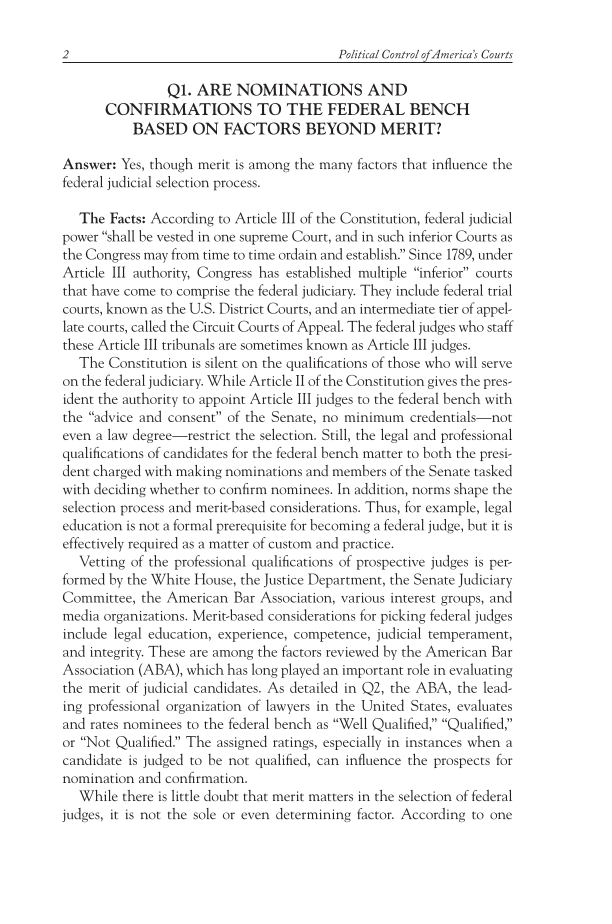2 Political Control of America’s Courts Q1. ARE NOMINATIONS AND CONFIRMATIONS TO THE FEDERAL BENCH BASED ON FACTORS BEYOND MERIT? Answer: Yes, though merit is among the many factors that influence the federal judicial selection process. The Facts: According to Article III of the Constitution, federal judicial power “shall be vested in one supreme Court, and in such inferior Courts as the Congress may from time to time ordain and establish.” Since 1789, under Article III authority, Congress has established multiple “inferior” courts that have come to comprise the federal judiciary. They include federal trial courts, known as the U.S. District Courts, and an intermediate tier of appel- late courts, called the Circuit Courts of Appeal. The federal judges who staff these Article III tribunals are sometimes known as Article III judges. The Constitution is silent on the qualifications of those who will serve on the federal judiciary. While Article II of the Constitution gives the pres- ident the authority to appoint Article III judges to the federal bench with the “advice and consent” of the Senate, no minimum credentials—not even a law degree—restrict the selection. Still, the legal and professional qualifications of candidates for the federal bench matter to both the presi- dent charged with making nominations and members of the Senate tasked with deciding whether to confirm nominees. In addition, norms shape the selection process and merit-based considerations. Thus, for example, legal education is not a formal prerequisite for becoming a federal judge, but it is effectively required as a matter of custom and practice. Vetting of the professional qualifications of prospective judges is per- formed by the White House, the Justice Department, the Senate Judiciary Committee, the American Bar Association, various interest groups, and media organizations. Merit-based considerations for picking federal judges include legal education, experience, competence, judicial temperament, and integrity. These are among the factors reviewed by the American Bar Association (ABA), which has long played an important role in evaluating the merit of judicial candidates. As detailed in Q2, the ABA, the lead- ing professional organization of lawyers in the United States, evaluates and rates nominees to the federal bench as “Well Qualified,” “Qualified,” or “Not Qualified.” The assigned ratings, especially in instances when a candidate is judged to be not qualified, can influence the prospects for nomination and confirmation. While there is little doubt that merit matters in the selection of federal judges, it is not the sole or even determining factor. According to one
Document Details My Account Print multiple pages
Print
You have printed 0 times in the last 24 hours.
Your print count will reset on at .
You may print 0 more time(s) before then.
You may print a maximum of 0 pages at a time.

































































































































































































































